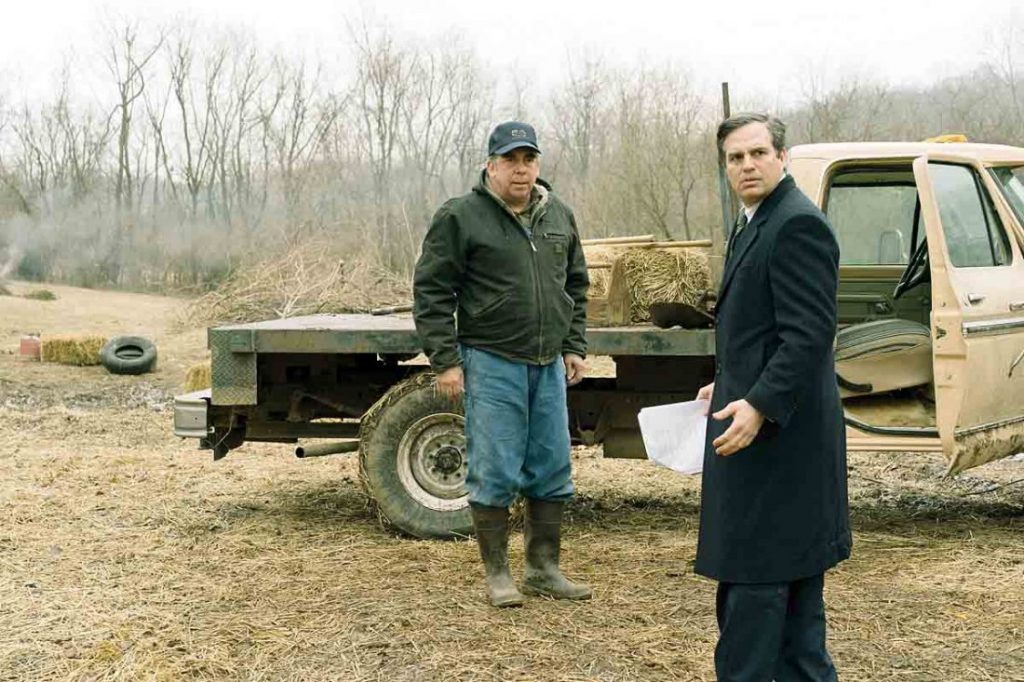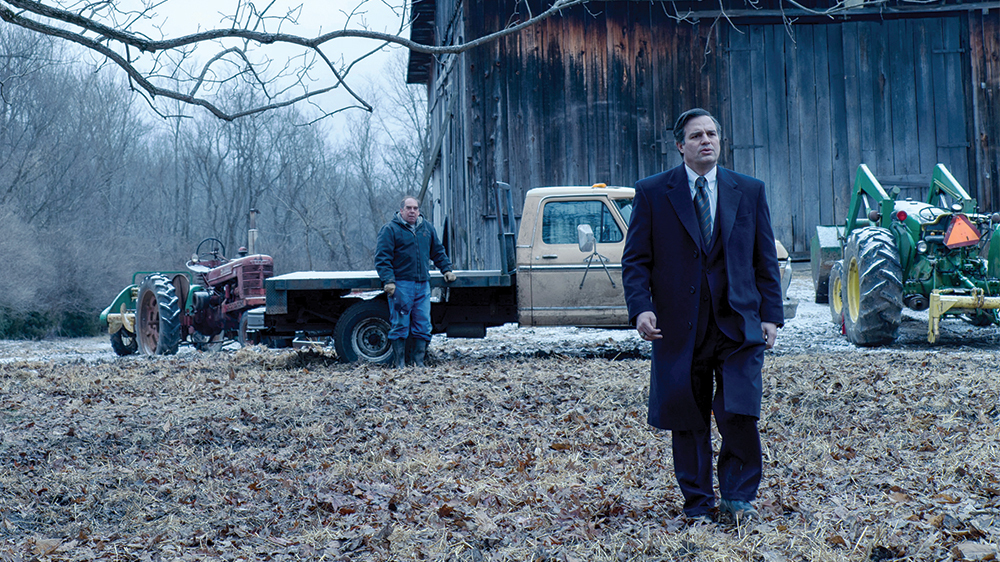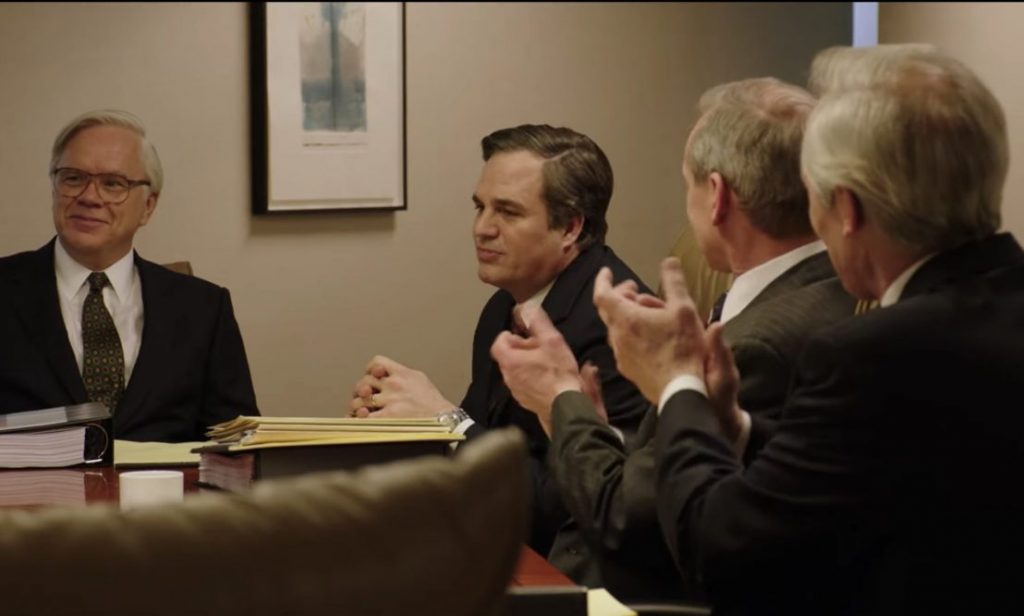I took a break from wrapping presents yesterday, and headed out to watch the film, Dark Waters, and smelted the seat beneath me I was so angry. The movie basically spun me into a vitriolic rage it affected me so. Not even Midsommar affected me this deeply…and if you read this blog regularly you know what that movie did to me!! But immediately after watching I immediately began digging – because while I enjoy a good vitriolic rage, I’d prefer it to be justified. And so, this blog post will walk you through the movie, and its differences from the historical record. I will, in short, be explaining how accurate the movie Dark Waters really is. Fair enough? Because, this movie really is just one enormous corporation train wreck of profit-driven ambition and selfishness.
First though, if you haven’t seen the movie, and have no idea who DuPont is, or how they are actually the the handmaiden to the devil, then you probably ought to go buy tickets today and watch the film. But, hey, I want the more people to know this story as possible. Movie or no. Heck, if you’d like to read directly from the sources I will be comparing the movie against I’ll just list them here below. Obviously though, this is a movie website, and I really really enjoyed this gripping movie. Heck, read the footnotes, watch the movie, don’t stop researching this tragic story. Because this is evil at an inhumane (literally) level.
- The New York Times article that started it all.
- The full story of Wilbur Earl Tennant, 1942-2009 and his obituary.
- The science behind Teflon’s Toxic Legacy.
- Welcome to Beautiful Parkersburg, West Virginia by Mariah Blake.
- Hill, Peterson Carper Bee & Deitzler Personal Injury Representation.
- The Intercept Investigation of the Teflon Toxin.
There are like ten more articles that I pulled from in the comparisons between the movie and history, but those are the most substantial resources that really helped the most. And a book I just read is “Stain-Resistant, Nonstick, Waterproof, and Lethal: The Hidden Dangers of C8” by Callie Lyons. (Did I mention when I get excited about something I go all in?)
Movie formulas are not my thing. When Hollywood decides for us that the best algorithm for creating a successful movie and then pounds that equation down our collective throats, we are all the worse off for it. Take, for example, the movie Rocky. When Sylvester Stallone got his screenplay created, he should have won an Academy Award for best screenplay, and then the formula should have been put to bed. But, alas, it was not. Worse! The formula was co-opted and suborned by the whistle-blower genre of movie as well. You know the one, Erin Brockovich-esque films that tout the single mom, study by night, stick it to the man formula. But, if truthful, these stories can be a more powerful reminder that the people are watching companies that would prefer to eschew protecting the public’s health, in exchange for corporate greed. And that is what Dark Waters does so well – it’s a reminder to the DuPonts, the Amazons, the Apples of this world – all of these mega-corporations that could so easily put their profits ahead of the public’s well being, that we will watch and will take action.

The Dark Waters Storyline
Dark Waters is a legal thriller based on the New York Times Magazine article entitled, “The Lawyer Who Became DuPont’s Worst Nightmare” by Nathaniel Rich. It was this article that caught Mark Ruffalo’s attention, and caused him to hunt down the rights of Rob Bilott’s story and to find out the inside story of his non-heroic demeanor. The story started with Mr. Bilott receiving Mr. Tennant, a long-term family farmer, at his offices who was certain that DuPont was poisoning his cattle. Of which 190 of his 200 cattle had died. The rocks in the stream feeding water onto his land were bleached white. The cows had horrible lesions, and the once docile creatures had become extremely hostile and attacked anyone that came near.
The research and reading I’ve done seems to indicate that the case is really pretty spot on. The Tennant family’s West Virginia cattle farm did back up to a DuPont plant. And the family did sell 10% of their 660 acre cattle farm acreage, which DuPont in turn used for dumping toxic sludge into the ground. Heck, DuPont even tested the effects of the groundwater runoff of PFOA on the Tennant farm. And the results of their tests event documented the extremely concerning levels and impacts for the Tennant’s cattle 10 or 15 years before they ultimately denied causing any issues with the cattle.
But ultimately, this movie’s storyline is about Rob Bilott’s decision to take on this case, and how it changed his life forever. Bilott, a lawyer for Taft Stettinius & Hollister, helped provide guidance on compliance implications for the Superfund law. (The Superfund law discussed how to manage hazardous substances and legal handle contaminated location.) Bilott’s once friendly relationship with the DuPont corporations turned sour over time as Bilott decided to take up the case.
If anything, the movie over glamorized Robert Bilott. Everything I’ve found seemed to indicate the man was/is the literal definition of unassuming. And while Mark Ruffalo isn’t overtly charismatic, he still is a movie star, and even his best acting still seemed to over characterize this extraordinarily low key individual. But we’ll forgive the movie this particular aggrandizement. And the final Bilott Hollywoodization seems to be his love for Mai-tai’s or alcohol in general. He apparently didn’t drink at all.

The Devil of this story is the DuPont executive Phil Donnelly (played by Victor Garber) isn’t a real character in the historical account of this story… as far as I can tell anyway. And as Bilott and Donnelly start the dialogue about the Tennant case they are friendly enough. But eventually the two come to blows and it explodes when Donnelly tells Bilott “Fuck you, hick.” Which, definitely seem to be an encounter entirely created in the screenwriting room. But the movie needed a devil, and it has one in the punching bag that is Donnelly.
Probably the most significant detail that can’t be overestimated is the contentious relationship between Bilott and Tennant. The film did a pretty good job of showing this awkward relationship – but it wasn’t 100% clear that it was Tennant’s absolute refusal to settle that really carried this movie forward. If he had just taken a payment from DuPont, the story would have lacked in the amazing scale and scope it had. It was Tennant – whose brother had been poisoned at the plant, and whose farm had been poisoned, really grasped the fact that DuPont was not attacking him specifically, but the entire community. And it was Tennant who should be given even more credit for this story than even Bilott. Bilott called out Tennant’s part in the story in a Washington Post panel discussion about the story, “It was really his dedication to bringing that out that really inspired me to try to find a way to address the bigger problem.”
Most importantly, DuPont – DuPont really was a corporation that came from the loins of Satan. For example, the details about DuPont offering their staff members Teflon-laced cigarettes? That really did happen. Think about that for a moment. They encouraged their employees to become lab-rats wherein they pumped TEFLON into their lungs just to see what would happen. Surprising to no one at all – 90% of the people that smoked the cigarettes ended up with flu-like symptoms. But the locals were so deep in the pocket DuPont, they didn’t stop for even a moment to realize what the money was doing to them.
My Thoughts on the Tennant Case
By and large, this movie is the real deal. Ruffalo did a really fantastic job keeping the story intact. And, unlike most Hollywood movies, it refrained from over romanticizing this story. I really saw no evidence of individuals breaking into the Tennant’s farm. But DuPont did hire a photographer in a helicopter to “photograph the farm” for research purposes. And Tennant really did point his rifle scope at the helicopter “to see who was in the helicopter!” hahaha. But yes, this really must have been an unbelievable story to live through.
The thing that drives me absolutely bananas though was the paltry amount that DuPont had to pay out for their truly evil conduct. From my research I couldn’t find more than a billion dollars that DuPont paid out. And worse, I personally believe that DuPont was INCENTIVIZED to pollute the land, and to create hazardous materials that turned extraordinary profits. Better yet, I actually found a paper that argues this exact position. Here’s a slice of the abstract to this really well reasoned and articulate paper.
“DuPont, one of the most respectable U.S. companies, caused environmental damage that ended up costing the company around a billion dollars. By using internal company documents disclosed in trials we rule out the possibilities that this bad outcome was due to ignorance, an unexpected realization, or a problem of bad governance. The documents rather suggest that the polluting was a rational decision: under reasonable probabilities of detection, polluting was ex-ante optimal from the company’s perspective, even if the cost of preventing pollution was lower than the cost of the health damages produced. We then examine why different mechanisms of control – legal liability, regulation, and reputation – all failed to deter a behavior that was inefficient from a social point of view. One common reason for the failures of deterrence mechanisms is that the company controls most of the information and its release. We then sketch potential ways to mitigate this problem.”
Which basically bodes extraordinarily ill for everyone who are perpetually held in sway by these multinational conglomerates. This paper basically posits that it is in these large companies’ best interest to do anything and everything to secure profits. DuPont’s scorched earth policy, and the loss of only one single year of Teflon profits proves that if they are in a position to do this again, not only will they, but that they should. From a survival of the fittest free market standpoint, it is in their best interest to user their employees as lab rats, and to maximize profits as best they can.
But think about this for a moment. If I had access to Teflon powder, and randomly decided to sell lemonade on the corner of my neighborhood laced with PFOA, I would be jailed immediately. No? 100% I would be. “But officer! I was curious if it was bad for the environment and the health of people around the world. So I decided to conduct my own experiment to find out! It’s for the good of the whole!! WHY ARE YOU LOCKING ME UP??!?” And I would deserve to be jailed. I’d be tried for attempted murder, or at the very least, poisoning people. Heck, reckless endangerment. The fact that DuPont was treated like a “faceless” agent completely let DuPont off the hook morally. The moral ill will the Tennant family was treated with was just unbelievable. Again. If I decide to walk to the edge of a farmer’s property and just start dumping some half-assed-chemistry-concoction I made just to see what would happen to the cows on the property, I’d be locked up outside of a week. But when it is DuPont, a faceless corporation, they are allowed off the hook morally. It is 100% wrong. We should hold corporate presidents accountable for their impacts to people and to the community. How else will we keep from watching them put their revenue above every other determining factor going forward?

My Thoughts on the Dark Waters Movie
Dark Waters was a slow motion trainwreck. It was impossible to turn away from. The actions of DuPont in general was flabbergasting. Their complete disregard to Tennant, his family, his farm, and the community at large is unbelievable. That DuPont and 3M have together injected 99% of the planet’s inhabitants with PFOA’s is just unbelievable to me. We have all been affected by their enormous hubris and pride. But to watch as Bilott and Tennant stood up to this enormous corporation and made them pay for this evil is satisfying on a level I can’t even describe. Now, granted, I’m not a fan of the Rocky screenplay formula…but when the bad guy is the devil himself, I’m all in.
Have you guys gotten a chance to watch this film yet? What did you think of it? I gotta know if maybe I’m overreacting here.
Edited by: CY

